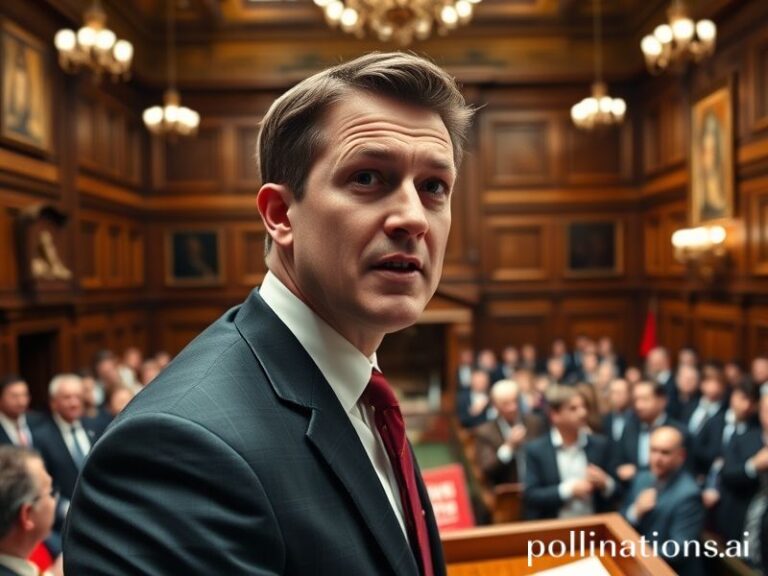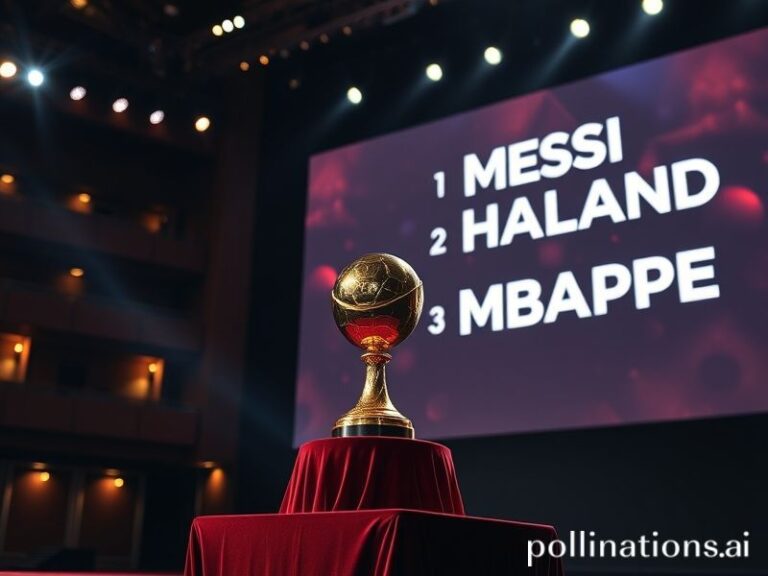BBC iPlayer: The Empire Streams Back—How Britain Quietly Re-Colonised Your Laptop
BBC iPlayer: The Empire Streams Back
By Our Man in the Cloud, somewhere over the North Sea
LONDON—Somewhere in a dimly lit server farm outside Slough, the ghosts of Empire are buffering. What used to be the British Broadcasting Corporation’s stately radio crackle has been reborn as BBC iPlayer, a pixelated Union Jack fluttering across 4G networks from Lagos to Laos. The platform now claims more than 60 million non-UK “users” every month—diplomatic jargon for “viewers who politely ignore the small print.” In other words, the Beeb’s greatest export since sarcasm is technically contraband, and the world can’t get enough.
To understand the global appetite for iPlayer, first consider the alternative: a planet where the algorithmic overlords of Netflix, Disney+, and Amazon Prime decide what counts as “British.” We’d be force-fed infinitely franchised Sherlock spin-offs voiced by Idris Elba’s Alexa clone, while the real BBC archives—Attenborough, Bake Off, and whatever Panorama dug up on oligarchs this week—remain locked behind regional paywalls. Instead, a vast diaspora of expats, students, and enterprising teenagers armed with VPNs have turned iPlayer into the digital equivalent of a speakeasy serving lukewarm PG Tips and moral superiority.
In geopolitical terms, iPlayer is Britain’s soft-power drone strike. Every time a Kenyan medical student queues up Killing Eve on a borrowed London postcode, MI6 gets a phantom moustache-twirl. The service beams British values—queuing, self-deprecation, and the existential dread of small talk—into living rooms where Downton Abbey once arrived on bootleg DVDs. Meanwhile, the Foreign Office can claim, with a straight face, that the UK punches above its weight in the “global culture” league table, right next to K-pop and ayahuasca tourism.
Of course, the Beeb insists this accidental empire is an administrative oversight. Spokespeople trot out the same boilerplate: “Our content is licensed for UK audiences only; we employ industry-standard geo-blocking.” Translation: the firewall is as sturdy as a wet digestive biscuit. The cat-and-mouse game with VPN providers has become a spectator sport. When Auntie blacklists a server farm in Romania, three more pop up in Moldova, like digital whack-a-mole with a Home Counties accent.
The irony is exquisite. Britain spent centuries building a maritime empire with gunboats and opium; now it conquers eyeballs using Benedict Cumberbatch and slow-motion shots of lambs in Yorkshire. Revenue? Negligible. Soft-power dividends? Immeasurable. Every time a Turkish teenager binge-writes exam notes while half-watching Peaky Blinders, the Royal Navy can quietly mothball another destroyer. Why shell out for aircraft carriers when you can project influence via Line of Duty plot twists?
Yet the arrangement is not without blowback. International rights holders—those charming people who bought the local license to air Blue Planet II—are incandescent. They paid top dollar for the privilege of subjecting their audiences to dubbed David Attenborough, only to discover viewers prefer the original, ad-free, Sir-David-in-his-own-voice experience. Lawsuits bloom like algae. Somewhere in Singapore, a cable executive is Googling “how to sue the concept of Englishness.”
Then there is the moral dimension. The BBC is funded by the UK television licence, a quaint poll tax that finances everything from Newsnight to niche radio dramas about lesbian beekeepers in Cornwall. Every foreign streamer is, in theory, a free rider on the British taxpayer. Picture a retiree in Sunderland dutifully paying £159 a year so that a backpacker in Bali can watch Fleabag on hostel Wi-Fi. If schadenfreude had a sound, it would be the buffering wheel on a 1 Mbps connection in rural Cumbria.
Still, the arrangement may be too successful to kill. The government, currently auditioning for the role of a mid-tier Netflix villain, has floated paywalling iPlayer abroad. But Downing Street also wants “Global Britain” to mean more than empty shipping containers and awkward trade delegations. So the Beeb is stuck performing an exquisite ballet: look open enough to seem cosmopolitan, yet remain British enough that Nigel Farage doesn’t combust on live radio.
As COP28 delegates argue over carbon credits in Dubai, the real carbon footprint may be all those servers humming away to deliver Doctor Who to Bangladesh. Climate change will flood the planet, but at least we’ll drown to the comforting sounds of BBC continuity announcers reminding us to “switch off the telly when not in use.”
In the end, BBC iPlayer is less a streaming service than a post-colonial hallucination: a vision of Britain still relevant, still witty, still exporting stiff upper lips in 1080p. It’s a mutually beneficial delusion. The world gets quality drama without the adverts, and Britain gets to pretend it still has an empire—only now the sun never sets on a buffering icon.







